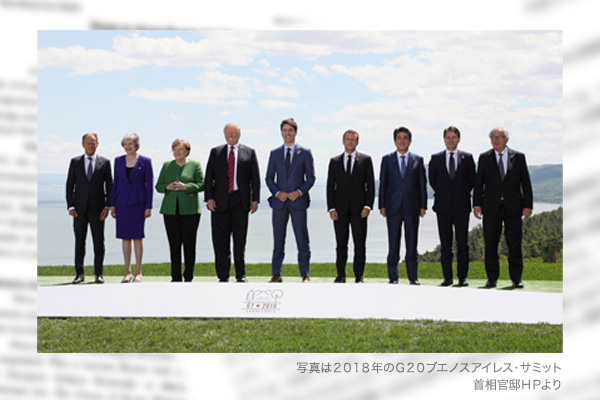Now that the Group of 20 summit for multilateral cooperation after the 2008 financial crisis has weakened its coordinating function, the flow of the whole conference will be determined by the direction of U.S.-China confrontation. U.S. President Donald Trump seeking his reelection next year will attempt to avoid any breakdown of his meeting with Chinese President Xi Jinping and seek superficial compromise for the U.S.-China tariff war. However, the two countries may leave their race for technology supremacy intact and are expected to plunge into a “clash of values” due to their mutual distrust, deepening and prolonging their confrontation.
From cooperation to confrontation
At the Buenos Aires G20 summit last year, the G20 declaration failed to retain a fixed phrase of fighting against protectionism for the first time ever due to the U.S.-China confrontation. At the coming Osaka G20 summit, the creation of digital economy rules and a World Trade Organization reform advocated by its chair, Japanese Prime Minister Shinzo Abe, may also induce confrontation rather than cooperation. While the United States and Europe demand restrictions on government control on business and personal data, China is attempting to absolutely avoid such restrictions. President Xi weathered massive protests in Hong Kong through substantial concessions and took a surprise action of flying to Pyongyang for talks with North Korean leader Kim Jong Un in an apparent attempt to take up the Korean Peninsula situation at his summit with Trump to prevent the bilateral summit from focusing on the trade dispute.
Considering sitting down to the negotiation table, President Trump for his part cancelled Vice President Mike Pence’s speech planned just before the coming G20 summit to criticize China’s human rights abuse and eliminated hawkish trade adviser Peter Navarro from a U.S. delegation for negotiations with China. However, Trump took actions to make bilateral negotiations advantageous for himself: he decided to effectively prohibit U.S. exports to China’s five major supercomputer makers. Of the five, Sugon provides basic domestic security control systems to the Chinese government and deals with major surveillance camera manufacturers. The U.S. action represents a new pressure on the Xi regime, following the exclusion of Chinese telecom giant Huawei Technologies.
Denying Westphalia order
Even if the U.S.-China summit makes any small progress in bilateral tariff negotiations, however, the bilateral confrontation on structural issues will remain unchanged. The confrontation is deep-rooted due to the U.S.’ race for global supremacy with China that is challenging the liberal world order. President Xi is conscious of creating a worldwide Hua Yi Order led by China. American China critic Gordon Chang cites Chinese Foreign Minister Wang Yi as describing President Xi’s diplomatic doctrine as transcending the traditional Western theories of international relations for the past 300 years in a journal of the Chinese Communist Party’s Central Party School, pointing to China’s ambition to deny the international order based on the territorial integrity and respect for national sovereignty as provided in the 1648 Treaty of Westphalia and shape a China-led international order.
In the Trump administration, the State Department’s Director of Policy Planning Kiron Skinner said the clash with China represents that with fundamentally different civilization and values, indicating a critical document to be published soon. Unlike the Trump administration’s National Security Strategy in 2017 ratchetting up U.S. competition with big powers, Skinner dared to emphasize a clash between values. If the U.S.-China confrontation develops into the value clash, the confrontation may become more difficult to resolve pragmatically. Japan should be prepared to see an even tougher U.S.-China confrontation and should clarify its attitude of defending the liberal world order.
Hiroshi Yuasa is a Planning Committee member and a senior fellow at the Japan Institute for National Fundamentals. He is also a columnist for the Sankei Shimbun newspaper.


